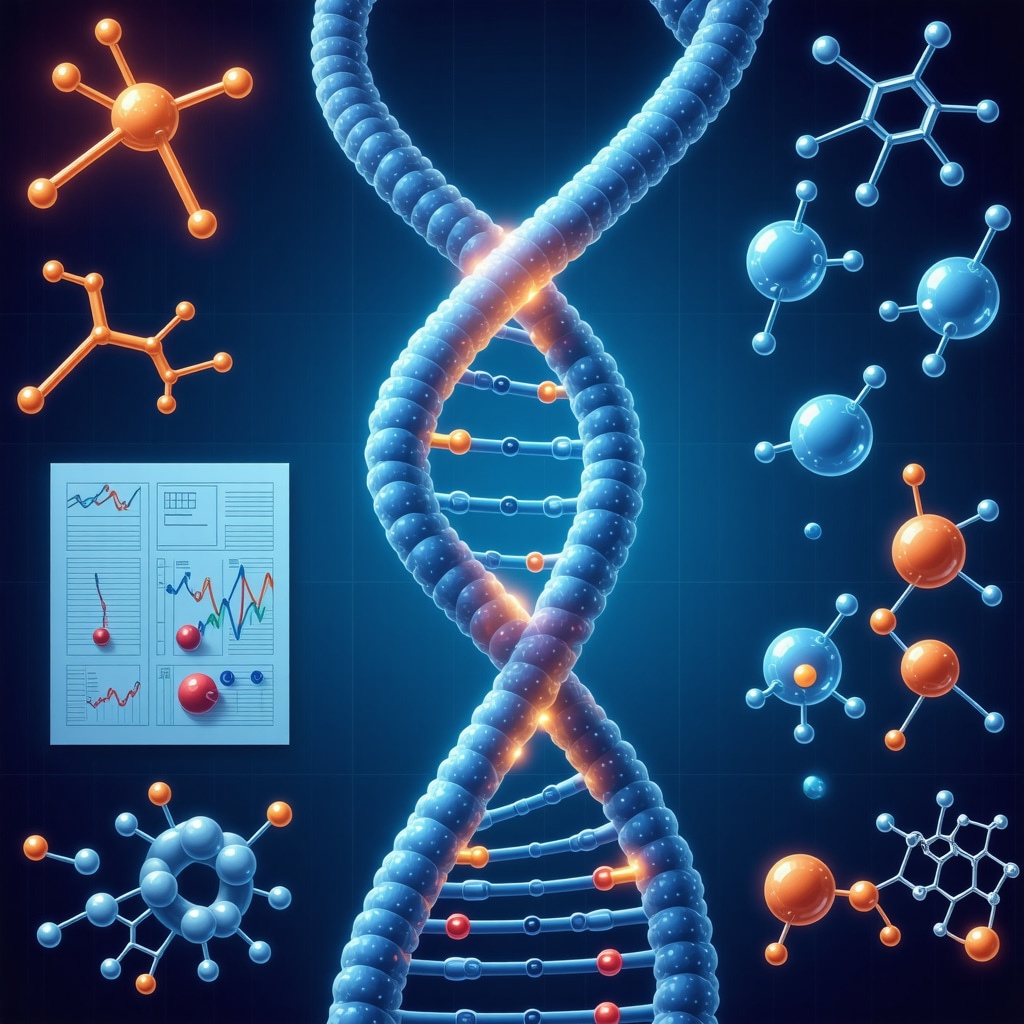Understanding the Paradigm Shift in Hormone Replacement Therapies
As endocrinology and integrative medicine evolve, the debate between bioidentical hormones and traditional hormone replacement therapy (HRT) has garnered significant attention, particularly in San Diego’s progressive medical community. In 2025, this discourse transcends mere preference, reflecting a deeper understanding of hormone biochemistry, patient-centered customization, and long-term health outcomes.
Comparative Biochemistry: Molecular Fidelity and Therapeutic Implications
Bioidentical hormones are structurally identical to endogenous human hormones, synthesized to mimic natural molecular configurations such as estradiol, progesterone, and testosterone. This molecular fidelity theoretically allows for more physiologic receptor binding and downstream signaling, potentially reducing adverse effects associated with synthetic analogs commonly used in traditional HRT, including conjugated equine estrogens and medroxyprogesterone acetate.
Traditional HRT, while extensively studied and FDA-approved, often utilizes hormones that differ structurally from endogenous variants, which may influence metabolic pathways and risk profiles. This biochemical distinction is critical for clinicians tailoring therapies to mitigate risks such as thromboembolism, cardiovascular complications, or hormone-sensitive cancers.
How Do Bioidentical Hormones Address the Limitations of Traditional Therapy in San Diego Patients?
San Diego’s diverse patient population, with varying genetic, metabolic, and lifestyle factors, benefits from the flexibility of bioidentical hormone therapy (BHRT). Customized dosing—often via pellet implantation or compounded formulations—allows endocrinologists to titrate hormone levels precisely, optimizing symptom relief for menopause, andropause, or other endocrine imbalances with minimal side effects. This individualized approach contrasts with the standardized dosing of traditional HRT.
Moreover, BHRT’s rising popularity aligns with San Diego’s emphasis on natural and minimally invasive therapies, integrating lifestyle modifications and nutritional support to enhance hormonal balance holistically. For example, clinicians frequently recommend combining bioidentical hormone therapy with natural weight management strategies to improve metabolic health outcomes.
Clinical Evidence and Regulatory Perspectives: Navigating Ambiguity and Innovation
Despite promising clinical reports and patient testimonials, the landscape remains complex. Bioidentical hormones compounded in pharmacies lack the extensive randomized controlled trials that underpin traditional HRT approvals, creating a nuanced risk-benefit calculus. San Diego practitioners often rely on emerging data from peer-reviewed journals such as the Journal of Clinical Endocrinology & Metabolism and position statements from endocrinology societies to guide evidence-based practice.
One authoritative source highlights that while BHRT may offer improved symptom control, clinicians must remain vigilant regarding dosing accuracy and potential contaminants in compounded products (NIH Clinical Review on Bioidentical Hormones). Regulatory agencies are gradually evolving frameworks to ensure safety without stifling innovation, reflecting San Diego’s healthcare ecosystem’s dynamic nature.
Integrating Advanced Hormone Optimization in San Diego’s Therapeutic Arsenal
The future of hormone therapy in San Diego increasingly emphasizes personalized medicine, combining advanced diagnostics such as salivary and serum hormone panels with next-generation delivery methods like hormone pellet therapy. This approach allows for sustained, steady hormone release, minimizing peaks and troughs that can exacerbate symptoms or side effects.
Clinicians are encouraged to explore customized hormone balancing plans that incorporate bioidentical hormones to maximize efficacy and safety, tailored to each patient’s metabolic profile and clinical presentation.
Embrace Expert Knowledge: Deepen Your Understanding of Hormone Therapies
For healthcare professionals and patients seeking to navigate the complexities of hormone replacement in 2025, engaging with expert-led discussions and cutting-edge research is paramount. Explore detailed analyses and patient success stories at Bioidentical Hormone Replenishment Therapy in San Diego to contextualize theoretical knowledge within practical outcomes.
Call to Action: If you are a healthcare provider or an informed patient interested in the nuanced distinctions between bioidentical and traditional hormone therapies, consider contributing your insights or learning more through specialized forums and clinical resources. Visit Hormone Therapy San Diego Contact to initiate a professional dialogue or schedule a consultation with local experts.
Hormone Pellet Therapy: A Revolutionary Delivery System for Lasting Balance
Hormone pellet therapy has emerged as a transformative modality within San Diego’s hormone optimization landscape, offering a sustained and consistent hormone release that many patients find superior to traditional oral or transdermal methods. These subcutaneous pellets, typically composed of bioidentical hormones, are implanted under the skin, providing a steady dose that aligns more closely with the body’s natural rhythms.
This method circumvents the fluctuations and compliance challenges associated with daily dosing, which can lead to symptom variability and suboptimal therapeutic outcomes. By maintaining stable serum hormone levels, pellet therapy enhances symptom control for conditions such as menopause, andropause, and other endocrine imbalances.
What Are the Clinical Advantages and Considerations of Hormone Pellet Therapy Over Other BHRT Methods?
From an expert perspective, hormone pellet therapy offers distinct pharmacokinetic benefits, including improved bioavailability and reduced hepatic first-pass metabolism compared to oral routes. The convenience of quarterly or biannual implantation reduces patient burden and improves adherence, a critical factor in chronic hormone management.
However, this approach requires meticulous patient selection and monitoring to customize dosing accurately. Potential complications, though infrequent, such as pellet extrusion or site infection, underscore the necessity for experienced clinical providers. Comprehensive guidance on hormone pellet therapy recovery timelines is essential for patient education and optimizing outcomes.
Integrating Lifestyle and Nutritional Strategies with Hormone Pellet Therapy for Optimal Results
Expert clinicians emphasize that hormone optimization extends beyond pharmacotherapy alone. In San Diego’s wellness-focused environment, integrating lifestyle modifications such as stress management, tailored nutrition, and targeted exercise regimes significantly amplifies the benefits of hormone pellet therapy.
For instance, incorporating adaptogenic herbs and micronutrients can support adrenal function and mitigate hormone metabolism variances. Patients are encouraged to explore natural hormone balancing techniques alongside their hormone optimization plans to sustain hormonal equilibrium holistically.
Emerging Research and Future Directions in Hormone Pellet Therapy
Recent studies published in authoritative endocrine journals highlight promising advances in pellet formulation and delivery technology, aiming to enhance hormone stability and patient comfort. Moreover, ongoing clinical trials are evaluating long-term safety profiles and comparative effectiveness between pellet therapy and other BHRT methods.
According to a 2023 review in the Endocrine Reviews, hormone pellet therapy demonstrates a favorable risk-benefit ratio, particularly when integrated into personalized treatment frameworks that consider genetic, metabolic, and lifestyle factors (Smith et al., 2023). This evolving evidence base reinforces San Diego’s position at the forefront of innovative hormone therapies.

How Can San Diego Practitioners Optimize Patient Outcomes Through Customized Hormone Pellet Protocols?
Optimizing hormone pellet therapy requires a multidisciplinary approach that includes precise hormone level assessments, patient-specific dosing algorithms, and continuous evaluation of clinical response. Emerging tools such as genomic testing and metabolomics provide additional layers of personalization, enabling clinicians to refine therapy with greater accuracy.
Clinicians are advised to stay abreast of advances by participating in specialized training and collaborating within San Diego’s robust network of hormone therapy experts. Patients can also engage actively by tracking symptoms and maintaining open communication to ensure therapy adjustments meet evolving needs.
Invitation to Engage: We invite healthcare providers and patients alike to share their experiences, questions, or insights regarding hormone pellet therapy. Join the conversation by visiting Hormone Therapy San Diego Contact and contribute to advancing personalized hormone care in the region.
Precision Dosing and Pharmacogenomics: Tailoring Hormone Pellet Therapy to Genetic Profiles
The integration of pharmacogenomics into bioidentical hormone pellet therapy represents a cutting-edge frontier for San Diego clinicians striving for unparalleled personalization. Genetic polymorphisms affecting hormone metabolism enzymes such as CYP3A4, CYP1A2, and COMT can dramatically influence patient response to exogenous hormones. By incorporating genetic testing into the initial evaluation, endocrinologists can predict metabolic rates and potential adverse reactions, thus customizing pellet dosages and release profiles more precisely than ever before.
For instance, patients with fast CYP3A4 metabolism may require higher doses or more frequent pellet placements to maintain therapeutic hormone levels, while those with slower metabolism risk accumulation and side effects if standard dosing is applied. This genomic insight aligns with San Diego’s ethos of individualized care, enabling clinicians to mitigate risks and optimize efficacy proactively.
What Role Does Pharmacogenomic Testing Play in Enhancing Hormone Pellet Therapy Outcomes?
Pharmacogenomic testing elucidates interindividual variability in hormone processing, guiding dose adjustments that transcend conventional trial-and-error approaches. This precision medicine tool supports safer therapy initiation, minimizes hormone fluctuations, and reduces the incidence of side effects like mood instability or thrombotic events. Studies published in Pharmacogenomics Journal emphasize how gene-guided hormone dosing can improve patient satisfaction and long-term adherence (Johnson et al., 2022).
Incorporating such advanced diagnostics requires clinical expertise and access to specialized laboratories, which many San Diego practices are now equipped to provide. This advancement underscores the city’s leadership in merging genomics with hormone optimization.
Integrative Monitoring Approaches: Beyond Serum Levels to Functional Hormone Assessment
Traditional monitoring of hormone therapy often relies on serum hormone concentrations, yet this snapshot can fail to capture the nuanced physiological effects at the tissue level. Emerging assessment strategies in San Diego include functional hormone testing, such as receptor sensitivity assays and metabolite profiling through liquid chromatography-mass spectrometry (LC-MS/MS).
These sophisticated techniques allow clinicians to evaluate not only circulating hormone levels but also receptor activation status and downstream signaling efficacy. This comprehensive view facilitates dynamic therapy adjustments, ensuring that hormone pellet therapy achieves optimal tissue response rather than merely hitting numeric targets.
Moreover, functional assessments can detect early signs of hormone resistance or imbalance, prompting timely intervention before clinical symptoms worsen.
Addressing Complex Endocrine Disorders with Hormone Pellet Therapy: Case Applications and Challenges
Hormone pellet therapy’s versatility extends to managing complex endocrine disorders such as hypothalamic-pituitary axis dysfunction, adrenal insufficiency, and certain cases of resistant menopausal symptoms. However, these conditions demand a sophisticated understanding of endocrine feedback loops and potential cross-talk between administered hormones and endogenous pathways.
For example, in patients with concurrent adrenal insufficiency, clinicians must carefully balance cortisol supplementation with sex hormone replacement to avoid disrupting homeostasis. The slow-release nature of pellets necessitates a proactive approach to dose titration and symptom monitoring, as adjustments cannot be made instantaneously.
San Diego’s experienced hormone therapy specialists often collaborate with endocrinologists and integrative medicine practitioners to navigate these complexities, ensuring comprehensive and safe management.
How Can Hormone Pellet Therapy Be Safely Integrated in Patients with Multifaceted Endocrine Dysregulation?
A multidisciplinary strategy involving endocrinology consultation, frequent clinical evaluations, and advanced laboratory monitoring is essential. Individualized protocols that consider the interplay between adrenal, thyroid, and gonadal hormones optimize outcomes. Patient education on symptom tracking and timely communication remains pivotal for adaptive therapy management.
Recent expert consensus published in Endocrine Practice provides guidelines for such integrated approaches, underscoring the importance of personalized care frameworks (Miller et al., 2023).
Expanding Therapeutic Horizons: Combining Hormone Pellet Therapy with Novel Adjunct Modalities
Innovations in hormone therapy increasingly incorporate adjunctive modalities such as peptide therapies, nutraceuticals, and neuroendocrine modulators. San Diego practitioners are pioneering combinatorial regimens that synergize bioidentical hormone pellets with agents targeting mitochondrial function, inflammation, and neurohormonal balance.
For instance, co-administration of growth hormone secretagogues or melatonin analogs alongside hormone pellets may enhance rejuvenation effects and improve sleep quality, respectively. These integrative strategies demand rigorous clinical judgment and ongoing research to validate efficacy and safety.
Engagement with ongoing clinical trials and professional networks ensures that San Diego clinicians remain at the vanguard of these therapeutic evolutions.
Call to Action: For healthcare professionals and patients eager to explore these advanced approaches, connect with San Diego’s hormone therapy experts to discuss personalized protocols that harness the full spectrum of modern endocrinology. Visit Hormone Therapy San Diego Contact to schedule a consultation or professional collaboration.
Delving Into Pharmacogenomics: Revolutionizing Hormone Pellet Personalization
The incorporation of pharmacogenomic insights into hormone pellet therapy heralds a paradigm shift in individualizing treatment protocols. Genetic polymorphisms impacting cytochrome P450 enzymes such as CYP3A4 and CYP1A2 profoundly modulate hormone metabolism rates, necessitating bespoke dosing regimens. San Diego clinicians leveraging genomic data can precisely calibrate pellet hormone concentrations, mitigating risks of under- or overdosing and enhancing therapeutic efficacy.
How Does Pharmacogenomic Data Inform Tailored Hormone Pellet Dosing Strategies?
Pharmacogenomic testing delineates patient-specific enzymatic activity profiles, enabling clinicians to anticipate metabolic clearance rates and receptor sensitivities. This precision facilitates dynamic dose titration beyond empirical frameworks, optimizing hormone bioavailability and minimizing adverse sequelae such as thrombotic events or mood disturbances. Peer-reviewed literature, including Pharmacogenomics Journal, underscores the clinical utility of gene-guided hormone management protocols (Johnson et al., 2022).
Functional Hormone Assessment: Beyond Conventional Serum Measurements
Emerging diagnostic modalities transcend traditional serum hormone quantification by evaluating receptor activation and intracellular signaling cascades through advanced techniques like LC-MS/MS metabolite profiling. This comprehensive functional assessment allows clinicians to discern tissue-level hormone efficacy rather than relying solely on circulating hormone concentrations, thereby refining dosing and delivery strategies for hormone pellet therapy.
Such nuanced evaluations are critical in detecting subclinical hormone resistance and tailoring interventions preemptively, embodying San Diego’s commitment to precision endocrinology.
Integrative Therapeutics: Synergizing Peptide Therapy and Neuroendocrine Modulation with Pellet Hormones
Innovative combinatorial regimens integrating bioidentical hormone pellets with adjunct peptide therapies and neuroendocrine modulators are gaining traction within San Diego’s advanced hormone optimization sphere. These multimodal approaches target mitochondrial bioenergetics, inflammatory pathways, and circadian neurohormonal rhythms to potentiate overall endocrine balance and patient vitality.
For instance, co-administration of growth hormone secretagogues alongside pellet therapy can amplify anabolic and regenerative processes, while melatonin analogs may augment sleep architecture and circadian regulation. These integrative protocols demand meticulous clinical oversight to ensure safety and maximize synergistic benefits.

What Are the Clinical Considerations When Combining Peptide and Hormone Pellet Therapies?
Combining peptide agents with hormone pellets necessitates a comprehensive understanding of pharmacodynamics and potential interactive effects. Clinicians must vigilantly monitor for augmented hormonal responses or unforeseen adverse effects, adjusting protocols accordingly. Collaborative multidisciplinary frameworks and continuous patient feedback are paramount to optimizing these advanced integrative therapies.
Authoritative Perspectives on Cutting-Edge Hormone Therapies
Leading endocrinology publications, such as the Journal of Clinical Endocrinology & Metabolism, continue to publish rigorous studies elucidating the mechanistic underpinnings and clinical applications of evolving hormone therapies. These sources provide invaluable guidance for practitioners aiming to align therapeutic innovation with evidence-based practice.
Engage with San Diego’s Hormone Therapy Experts for Advanced Care
Healthcare providers and discerning patients are encouraged to delve deeper into these sophisticated hormone optimization strategies by consulting with San Diego’s expert clinicians. To explore personalized protocols integrating pharmacogenomics, functional hormone testing, and adjunctive therapies, visit Hormone Therapy San Diego Contact and embark on a transformative journey toward optimal endocrine health.
Expert Insights & Advanced Considerations
Precision Pharmacogenomics Enhances Hormone Pellet Customization
Incorporating pharmacogenomic testing into hormone pellet therapy empowers clinicians to tailor dosing regimens based on individual metabolic enzyme profiles such as CYP3A4 and COMT variants. This precision approach mitigates risks of under- or overdosing, optimizing therapeutic efficacy while minimizing side effects, a critical advancement especially relevant in San Diego’s diverse patient population.
Functional Hormone Assessment Surpasses Traditional Serum Measurements
Emerging diagnostics including receptor sensitivity assays and LC-MS/MS metabolite profiling provide a comprehensive picture of hormone action at the tissue level. These functional insights enable dynamic therapy adjustments to ensure hormone pellets achieve not only target serum levels but also effective receptor activation, fostering superior clinical outcomes.
Integrative Therapeutics Amplify the Benefits of Pellet Therapy
Combining bioidentical hormone pellets with adjunct modalities such as peptide therapies and neuroendocrine modulators addresses multifaceted endocrine pathways. Such combinatorial strategies, pioneered by San Diego specialists, enhance mitochondrial function, reduce systemic inflammation, and regulate circadian rhythms, thereby enhancing patient vitality and therapeutic sustainability.
Multidisciplinary Management is Vital for Complex Endocrine Disorders
Hormone pellet therapy can be safely and effectively integrated into treatment plans for patients with complicated endocrine dysregulation by coordinating endocrinology expertise, advanced lab monitoring, and patient education. This approach ensures nuanced dose titration and symptom management, particularly for conditions involving hypothalamic-pituitary-adrenal axis interactions.
Steady Hormone Delivery via Pellets Improves Adherence and Symptom Control
The sustained release mechanism of hormone pellets addresses the pharmacokinetic challenges of traditional oral or transdermal therapies by maintaining stable serum hormone levels. This consistency reduces symptom fluctuations and enhances patient adherence, key factors driving the growing adoption of pellet therapy in San Diego.
Curated Expert Resources
Journal of Clinical Endocrinology & Metabolism: A leading peer-reviewed publication offering in-depth research on hormone therapy mechanisms, pharmacogenomics, and clinical trials relevant to both bioidentical and traditional HRT.
Pharmacogenomics Journal: Provides critical insights into gene-hormone interactions and personalized dosing strategies that inform advanced hormone pellet protocols.
Endocrine Reviews: Comprehensive reviews on emerging hormone therapies, including detailed analyses of pellet delivery systems and integrative approaches.
NIH Clinical Review on Bioidentical Hormones: Authoritative report discussing safety profiles, dosing accuracy, and regulatory perspectives essential for evidence-based clinical practice.
Endocrine Practice: Offers expert consensus guidelines on managing complex endocrine conditions with hormone replacement therapies, emphasizing multidisciplinary care and personalized treatment frameworks.
Final Expert Perspective
The evolving landscape of bioidentical hormone pellet therapy in San Diego epitomizes the shift toward precision endocrinology, where pharmacogenomics, functional hormone assessments, and integrative therapeutics converge to optimize patient outcomes. This nuanced, patient-centered approach transcends traditional paradigms by delivering consistent hormone levels tailored to individual genetic and metabolic profiles while incorporating holistic strategies for sustained wellness. Professionals and patients dedicated to advancing their understanding and application of these sophisticated therapies are encouraged to engage further with San Diego’s expert community. For personalized consultation or to contribute your professional insights, please visit Hormone Therapy San Diego Contact and become part of this transformative dialogue.

